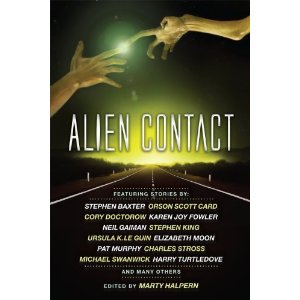Actually, just one. I’d like her to stop trying to be an authority on science fiction. I haven’t read her new book of essays on the topic, but I’ve heard her in interviews and read some of her thoughts in the past, and based on that she’s pretty much a tourist. Back when her publisher thought claiming her work was science fiction would hurt her sales, she misunderstood the genre magnificently (“Oh, sci-fi has rockets in it. I don’t do that.”) A lot of it reminded me of Susan Sontag’s egregiously off-base attempt to define it.
Of course, being in the same company as Sontag isn’t a bad thing, especially not if you want to remain within the fold of the folks who persistently fail to “get” any kind of genre work. But it has become obvious that Atwood likes some of the aesthetic possibilities in SF and can’t help using them, and it has become likewise obvious that claiming common cause with SF isn’t hurting her sales, so now she’s a very Out There advocate.
But she still doesn’t get it. In a recent interview she characterized SF as basically religious, since it speaks to the desire to embrace something vast and elemental and be awed—the way one is supposed to be awed by religious epiphany and ritual evocation of spiritual connection.
There are two things wrong with this. One, it suggests that the only way humans can experience awe and wonder is within a framework that can only be defined as religious. Two, it ignores the decades-long assault on paradigms that is the core impulse in written SF. Religion is nothing without the continuity of its paradigms, preserved as they are by the acceptance of their unassailability. But, like science, science fiction has no reverence for paradigms that fail to explain anything and the tendency is to go at them tooth and claw in order to rip away the caul that muffles genuine transcendence. This is not religious in the least—it is, if anything, the aesthetic of the newest gadget, a consumer culture variant that says anything done last year is, you know, Last Year.
 That said, science fiction is also like an overcrowded antique shop whose proprietors just can’t bring themselves to throw anything out. Everything that was ever done in the genre since 1926 is still there, used and reused, and that, too, is very much like science.
That said, science fiction is also like an overcrowded antique shop whose proprietors just can’t bring themselves to throw anything out. Everything that was ever done in the genre since 1926 is still there, used and reused, and that, too, is very much like science.
Because being “wrong” in the overall sense doesn’t mean all the bits by themselves are in error or are useless. Alchemy and Chemistry are separated by an insurmountable barrier of fact, but some of the laboratory methodology devised in alchemy is still useful in modern chemistry, at least conceptually. Einstein superseded Newton in ability to explain the universe at large, but we haven’t tossed Newton in the dustbin when it comes to working out simple cause-and-effect relations on the macro scale. No one takes Doc Smith’s Lensmen series seriously anymore, but we’re still writing about starships, elite cadres of supercompetent heroes, and interstellar warfare with inscrutable aliens. We just don’t do it with the kind of naivete E.E. Smith used.
But more than that, the points we’re making are different. We’ve moved on to more sophisticated themes, or even themes that were not considered at all half a century ago. John W. Campbell Jr. declared in the pages of Astounding that no aliens could be morally superior to humans. That’s a laughable, pathetic idea today, but we do still wrestle with the potential relationships.
Ms. Atwood should read more fantasy if she wants to find religious fiction. Science Fiction is all about how the universe is not dependable, reliable, or amenable to petition. Religion is about finding a way to stability through the assertion of belief over circumstance. Science is about figuring out how things work. Science Fiction is about how to live in the universe science shows us, which offers only the most conditional stability.
To be fair, I understand where she might get that idea, that SF is religious. It’s the awe, the “sense of wonder”, that is difficult to separate from one of the “varieties of religious experience.” And it may well be that people turn to religion for exactly that thrill of awe. But that’s not the point of religion. And the source of the awe is very different.
I’m glad she likes SF now. But I’m less sanguine about the expectations she will provide those just coming to SF after having read her ideas. I suspect many of them will be disappointed and give up on it. In this regard, I see her as very much like Harold Bloom, who dumped all over Harry Potter because he thought it was inferior to what he regards as worthwhile YA, all the while missing the good part of the whole Harry Potter phenomenon.
On the the other hand, maybe it won’t make any difference. Maybe no one will really pay any attention. That, too, will be a shame.




